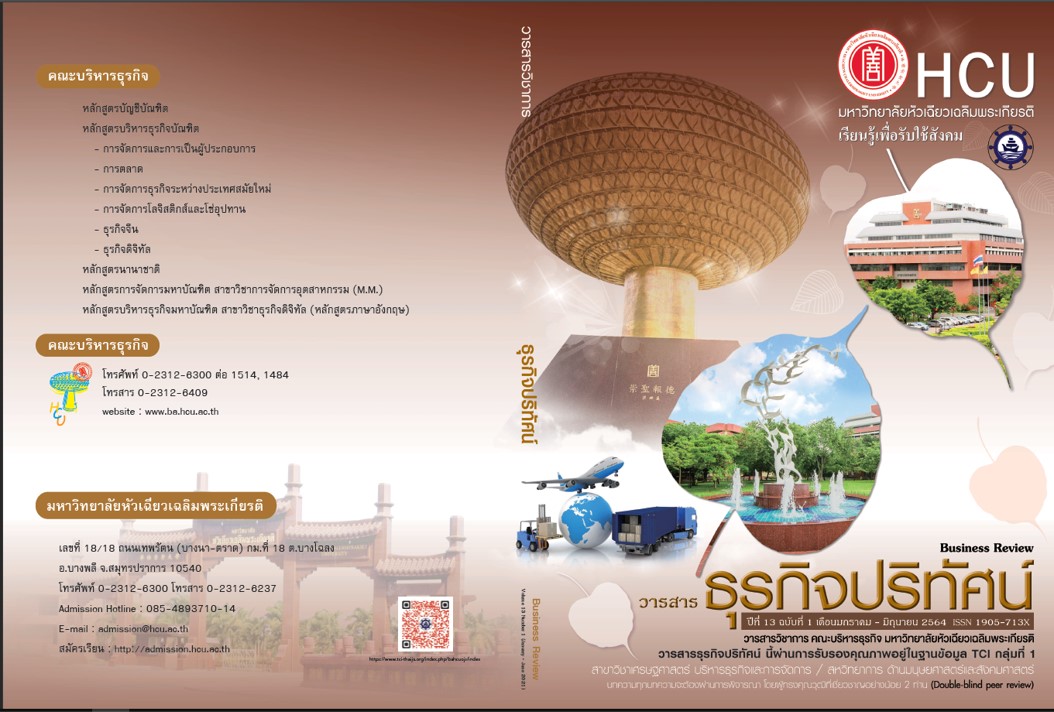A Causal Model of Corporate Social Responsibility Affecting Customer-based Brand Equity (A Case Study of Automobile Manufacturers in Thailand)
Keywords:
Corporate social responsibility, Awareness, Intention to purchase, imageAbstract
Corporate social responsibility (CSR) activities are important for doing business because those activities show how business care about consumers and society. The purpose of this research is to examine a causal model of corporate social responsibility affecting customer-based brand equity. Researchers conducted a survey research of 406 samples. The finding indicated that corporate social responsibility (CSR) activities had a significant effect on awareness, intention to purchase, and creating a good image for the business.
References
Aaker, D. A. (2002). Building strong brands. London: Simon & Schuster.
Anderson, J. C., & Gerbing, D. W. (1988). Structural equation modeling in practice: A review and recommended two-step approach. Psychological Bulletin, 103(3), 411-423.
Automotive Industry Portal MarkLines. (2017). Thailand-Flash report, Sales volume, 2017.
Retrieved May 11, 2019, from Marklines Website: https://www.marklines.com/
Barnett, G. A., & Boster, F. J. (1997). Progress in communication sciences: Advanced in
persuasion. Volume 13. New York: Ablex.
Belch, G. E., & Belch, M. A. (2018). Advertising and promotion: An integrated marketing
communications perspective (11st ed.). New York: McGraw-Hill/Irwin.
Carroll, A. B. (1991). The pyramid of corporate social responsibility: Toward the moral
management of organizational stakeholders. Business Horizons, 34(4), 39-48.
Davis, J. A. (2010). Competitive success: How branding adds value. Glasgow: John Wiley &
Sons.
Hair, J., Anderson, R., Tatham, R., & Black, W. (1998). Multivariate data analysis (5th ed.). New York: Prentice Hall.
Ho, R. (2006). Handbook of univariate and multivariate data analysis and interpretation with SPSS. Florida: CRC Press.
Kapferer, J. (2008). The new strategic brand management: Creating and sustaining brand equity long term (4th ed.). Philadelphia: Kogan Page.
Keller, K. L. (1993). Conceptualizing, measuring, and managing customer-based brand equity.
Journal of Marketing, 57,1-22.
Kotler, P., & Kotler, M. (2012). Market your way to growth: 8 ways to win. New Jersey:
John Wiley & Sons.
Kotler, P., & Lee, N. (2005). Corporate social responsibility: Doing the most good for your
company and your cause. New Jersey: John Wiley & Sons.
Kumar, R., & Saha, R., & Sekar, D. C. (2018). Consumer's response to CSR activities:
Mediating role of brand image and brand attitude. Corporate Social Responsibility and
Environmental Management, 26(2), 377-387.
Murphy, P.E. (1978). An evolution: Corporate social responsiveness, University of Michigan
Business Review, 6(30), 19–25.
Rahim, R. A., Jalaludin, F.W., & Tajuddin, K. (2011). Consumer behavior towards corporate
social responsibility in Malaysia. Asian Academy of Management Journal, 16(1),
-139.
Tim L., Xia W., & Kungchi L., (2015). Consumer responses to corporate social responsibility
programs: The influence of company-cause fit and consumer involvement. Nankai
Business Review International, 6(4), 364-380.
Downloads
Published
How to Cite
Issue
Section
License
All articles published in the Business Administration and Management Journal Review are copyrighted by the journal.
The views and opinions expressed in each article are solely those of the individual authors and do not represent those of Huachiew Chalermprakiet University or any other faculty members. Each author is fully responsible for the content of their own article. Any errors or issues found are the sole responsibility of the respective author.




